For me, it would almost be a perfect dream. I can only imagine opening the doors on a barn and coming face-to-face with a 1966 Jaguar E-Type Coupe. That has been the good fortune for the current owner of this classic, and he discovered that it had occupied that spot since 1986. He has coaxed its glorious engine back to life, and he now needs to find a buyer willing to return this classic to its former glory. Located in Terre Haute, Indiana, you will find the Jag listed for sale here on eBay. Bidding has reached $30,100, and I’m not surprised that this figure remains short of the reserve.
When a Jaguar E-Type project car lands on our desks here at Barn Finds, it seems that more often than not, these cars represent significant restoration projects. Rust usually gets its teeth into that classic British steel, and it takes some work before it withdraws its fangs. That isn’t the case here because, while the seller admits that a previous owner performed work on the rockers and treated the car to a repaint in its original Opalescent Silver Grey, the vehicle appears to be clean and structurally sound. The lower rear quarter panels, rear valance, and the section around the hatch all appear clean. The same is true of the floors and frame, which means that this has the potential to be a reasonably straightforward restoration project. However, it’s worth remembering that being a straightforward restoration doesn’t necessarily equate to the process being inexpensive. The panels look pretty straight, so that’s one aspect that shouldn’t consume vast amounts of cash. This is balanced by the apparent deterioration of the beautiful wire wheels. These will need to find their way to a specialist for some restoration work, and if the spokes require replacement, that will consume some money. However, performing any restoration work to the highest standard should be worth the cost and effort when you consider the potential value of this car once the tools are put down for the last time.
The previous owner parked the E-Type in his barn in 1986 to attend to a brake issue. Sadly, he never managed to tackle the problem, and the car was left alone and forgotten for the following thirty-five years. When the seller found the vehicle, he quickly trailered it back to his workshop. When he delved below the surface, he received a pleasant surprise. Not only had that dry barn and concrete floor preserved the classic steel, but the drivetrain was also far better than expected. This Jag rolled off the production line equipped with the glorious DOHC 4.2-liter six-cylinder engine that would have produced 266hp in its prime. All of those horses find their way to the rear wheels via a 4-speed manual transmission, while four-wheel disc brakes and independent suspension on all corners help the E-Type to handle and stop as impressively as it goes. Pointed at a ¼ mile, the journey should be nothing but a pleasant memory in 14.9 seconds. Once the seller had this Jag sitting in his workshop, he began to tinker. After a thorough mechanical check and replacing the fuel tank, that beautiful motor roared back to life without an issue. He bypassed the booster, and that returned the brakes to a working state. The owner has driven the car locally but recommends that the buyer rebuilds the booster and inspects everything thoroughly before attempting any long-distance journeys.
The interior of a Series I Jaguar E-Type rates as something special. While the later cars were an evolution of these earlier examples, these early cars feel closer to embodying a classic British sports car. Apart from the enormous speedometer and tachometer that command the driver’s attention, it is the collection of toggle switches on the dash that impart that traditional feel. Regulatory changes meant that Jaguar fitted subsequent models of the E-Type with rocker switches, and I’ve always felt that the interior lost part of its character when that happened. If I were to buy this car, I would treat the entire interior to a deep clean before I considered spending one penny on it. I believe that some time spent with high-quality cleaning products could prove rewarding. There’s no denying that the carpet has seen better days, and there is some noticeable deterioration on the console. However, the upholstered surfaces look pretty respectable, as does the dash. There might be a few plated components that will require attention, but as seems the case with the rest of this car, whipping the interior into shape may not prove to be a difficult undertaking.
I’ve previously mentioned my love for the Series I Jaguar E-Type, and I have had the great privilege of driving an early 3.8-liter version many years ago. It has left a mark on me like no other classic car, and one of these would make the top of my list if I had enough money to compile my garage of dream cars. During the 1980s, they were not a particularly popular car. The sad reality was that newer sports car offerings from Europe and Japan made them seem dated and irrelevant. However, the worm has turned, and you will struggle to find a spotless Series I of any description for less than a six-figure sum. It is possible that if the car in question is pristine, that price could edge beyond $200,000. With that historical background, it’s easy to see why this classic was parked and largely forgotten in 1986. It also helps to explain why the bidding has been spirited since the owner placed it on the market. I wouldn’t be surprised to see the bidding top $60,000 before the hammer drops, given the car’s overall condition. Even at that price, it should still be a financially viable project car. I’m not ashamed to say that I will envy this car’s next owner. Will you?
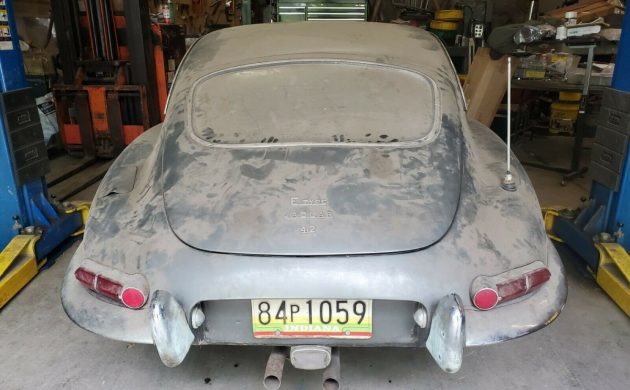
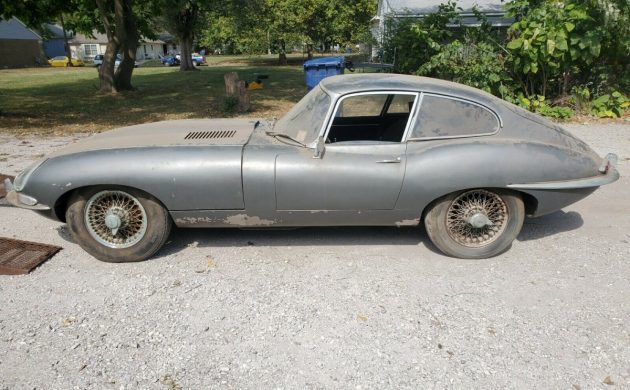
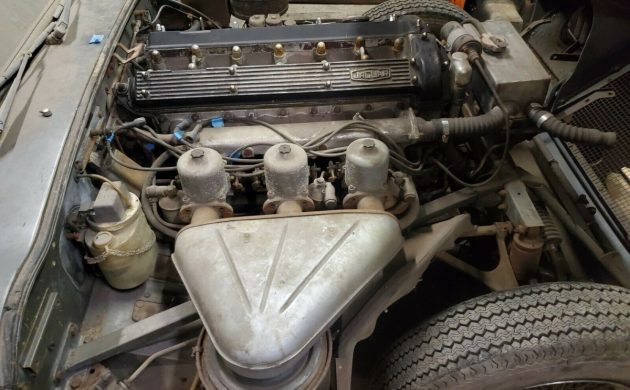
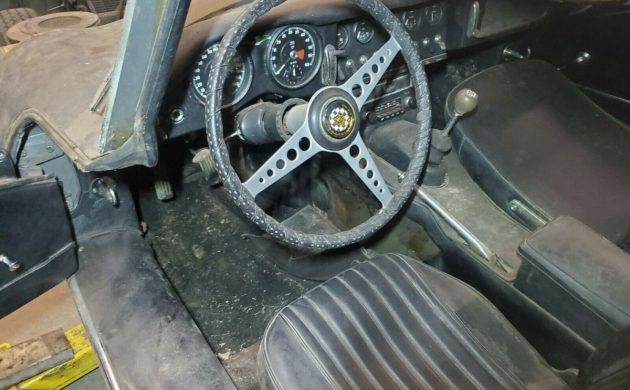
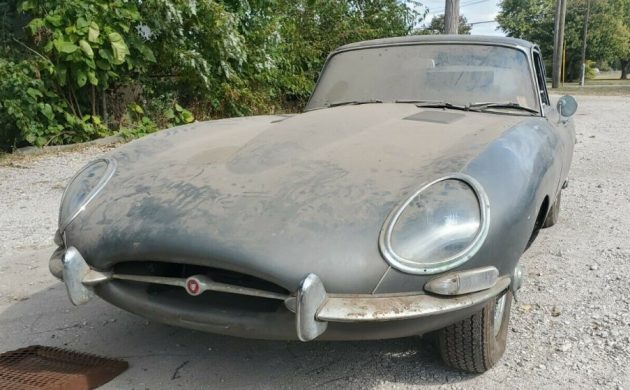





For goodness sake, give the baby a bath. One or two pics of dust is OK, but a little spit & polish to give glimmers of hope is always welcome…IMO natch.
There’s a school of thought that potential buyers want the experience of getting to wash off the barn dust. I guess it commodifies the whole lore of uncovering the barn find.
Sellers that buy into this line of thinking cost themselves money. It can work on a rare and desirable car if it’s being sold to someone willing to inspect it in person. This is not a wise strategy for common cars or those being sold on remote auction based platforms.
Many sellers following this route are misguided, they don’t understand the way the market works, they willingly fit into stereotype of the lazy seller.
Steve R
I am all for the “dusty how it was found”, LOVE those photos…..BUT photos of it cleaned up/washed to some degree are a MUST.
Fahrvergnugen: AMEN!
If I had copped this jewel and was hauling it out of storage, I’d have taken even more photos of it than the seller did. But then, I’d have given it a thorough scrubbing before trying to get it running and stopping. I never liked working on dusty/dirty cars.
Wouldn’t think of bidding on it without a complete in-person inspection. In fact, I’d want to have an expert check it out; I’ll bet there are problem areas beneath problem areas on these, and any needed repairs to the monocoque would require a sharp craftsman, which means they’d be costly, but essential.
When I see cars like this, the first thing I wonder about is: How much did the seller pay for it? I suspect there’s a healthy profit margin built into the reserve price. If I had the funds, I wouldn’t care. I’d just buy, restore, and drive.
Like the way you think Ray T. We prewarned our customers that we didn’t work on dirty cars and requested they wash the car and pressure wash the engine compartment. Only had one customer over the 10 years that didn’t go along with our rules and sent his car to another shop who for all practical purposes ruined the car. Would have been nice to see what was under the Jaguar dust. As said before, you don’t just jump into a restoration on these cars. It’s inch by inch work on a very complicated car.
And how much is the “seller” going to make flipping the car.?
Would anyone have the guts to restore this car mechanically, clean it up and then use it as a daily driver? I would…except the price is out of my range.
Meh. It has enough miles on it that actually using it shouldn’t be a problem. Unless you wear it out, you insure it for crash damage and enjoy it, then sell it for a profit when you go on to something else.
Gee, I’m glad he got it driving. I wonder how far he drove it with the radiator in the back hatch area? Far enough to get it warmed up I think.
I was not aware that coupes were commanding $200k prices. Lacking a sawzall and some pretty good panel beating skills, this will never be a roadster.
Pretty nice car, tho.
I’d detail it, fix the little stuff and drive it like I stole it. For the 2 hours till something else failed. A RUNNING Jag is a rare and elusive thing.
Truer words were never said Alan !!
A RUNNING Jag is NOT a rare and elusive thing, Alan Brase. What is a rare and elusive thing is owners in America, who maintained and serviced their Jag competently, and at the intervals specified in the owner’s manual. My ’69 E Type had the good fortune of having been maintained correctly by its five owners–including myself–and it runs like a dream. I was out in it yesterday with a big smile on my face…and I am so sad that the summer has just about come to an end. These are exotic sports cars that were made to reward owners who serviced them competently, per the manual…and people who expected them to be rustic beasts of burden, like a pick-up truck, that would forgive abuse and neglect…well they and their wallets were in for a surprise! Try NOT servicing a classic Ferrari for any period of time…
Regardless of how it got here, this one is headed for a bright future.
Not one picture of it washed? I think Facebook Marketplace would have been better for you to list it. That is for lazy people and for the fly under the wire people.
I am puzzled by the fact that this is the latest of many (at least 3 or 4) Barn Find ads listing E-type Coupes that are actually 2+2 models. I suppose they could still technically be called coupes, but it seems curious that no one ever calls out the back seat and hatch.
This is def not a 2+2 – easily picked out by the shorter doors.
Looks like a coupe to me. The 2+2s had a different roofline compared to the Coupes and didn’t come out till late 67.
The pictures aren’t clear of the interior but the roofline looks like a fixed head coupe to me. The seller has included a pic of the heritage certificate and it shows a fixed head coupe. Not sure how it would read if it were a 2+2 but I imagine they would have made it known.
The seller states in the ad that it is NOT a 2+2, or even a Roadster, although the words Roadster show up in the ad.
Once upon a time it might have been interesting to me. Now? Meh. 15 second quarter mile times now are achieved by 4-cylinder cars that also get 30+ mpg, with unleaded gas. And I know people love the look, but it just looks narrow to me, with the driver sitting way too close the the windshield.
Plus it’ll take years? to fix. Clutch first, and then, as long as the motor is out, ….. and by then, electric vehicles will be taking over the roads.
All of this is JMO. Should provide someone with some goals, just not me.
And sorry, when an article advertises a projected value, based on what? I wonder whether I’m reading a story, or ad.
Couple of concerns here – with the dual circuit brakes on a 4.2 the booster is an integral part and can’t be simply ‘bypassed’ like on a cooper S, and the late valve covers hopefully don’t hide an engine swap.
Much to like tho
Jag info needed — What is the “fixed head ” option / car / series / — not sure about correct name . Is that a coupe car or 2+2 or what is the correct info/difference . I know it’s not a Roadster but not sure on Jaguar facts . Could someone explain the facts on this .
James, The Jaguar XKE was offered initially in two versions, the roadster an the coupe. Both were two seaters. Later a third version was added, the 2+2. It had a higher roofline and a couple jump seats to accommodate rear passengers. Folks these days don’t seem to like the 2+2 as much as the fixed head coupe. So they tend to sell for less money. Of course everyone wants a convertible so that is the priciest of the bunch to have. There is also a difference between the covered headlights and uncovered, the 3.8 vs the 4.2 engines, and the 6 cyl vs the 12 cyl. Entire books have been written on the differences in models.
James I believe the convert E types would be called a drophead coupe. A roadster has no roll up windows. The E shown here would be a fixed head coupe. I have a BMW Z 3 that BMW stamped Roadster on the door sills, it has glass windows. Go figure. Take care, Mike. Ended:Sep 21, 2021 , 3:00PM
Current bid:
US $53,107.00
Reserve not met
[ 44 bids ]
One of my favorite cars. I had a 1967 XKE convertible. I loved the car until I had a water pump problems with 10,000 miles on it. The dealer told me it would be a month before it was fixed because the pump was coming from the UK. The vehicle sat at the dealer in Mass. Once it was fixed I traded it in on a new 1969 Corvette.
It may not have the original engine as the 1964-1967 E-Types are supposed to have the polished aluminum valve covers (’68-’71 had the machined ribs as shown).
Beautiful car!
Something no one so far has noticed: this car will never be a top-of-the-line collectible, unless it is somehow reunited with its original engine. It is a ’66 Series I 4.2 litre…but it has a ’68-71 motor. The Series I had the polished camshaft covers and gold paint between them, that dated back to the XK-120 of 1948. This car has silver paint and the ribbed polished and black “industrial” cam covers…although someone saw to it that the engine got the triple SUs. If this non-numbers-matching engine’s number ends in a 9, at least it has a ’68 or ’69 variant that should have the same power output as the Series I. If, however, the engine number does not end in a 9, that means it is a late 1970 or ’71 engine with 7.9: 1 compression…
Seller states several times in the ad that he has confirmed the numbers with the heritage report. Would the later valve covers fit on the earlier head? Might send him a question on e-bay if you really want to know.
Probably does not have the original engine as the ’64-’67 had polished valve covers vs. the more mundane machined ones from ’68-’71.
There’s a bit of grass on the front suspension leading me to believe that it spent sometime in a field, and it looks pretty rusted-up. The torsion bar suspension can be tricky – busted a finger unfreezing mine!
That said, this is a great looking car, and as the author points out a pretty good handling one for the era. It looks complete and surely worth restoring. Bid is up to $45K now.
GordyP: whether the polished cam covers were nicer than the ribbed ones is a matter of personal taste. Jaguar introduced the ribbed ones for a good reason. It was part of its improvements to the car’s cooling. Twin electric fans were introduced (first production car in the world to have them), and the Series II E Type also became the first car anywhere to get a crossflow radiator. The cam covers were ribbed to DOUBLE the heat dissipation through the louvres right above. The ribbing was a classic racing trick applied to a street car. The ribbing has the effect of DOUBLING the camshaft cover surface, as far as getting rid of engine heat is concerned.
My dream car back in the 60’s, then the strip and muscle entered my life. End of dream, until now.